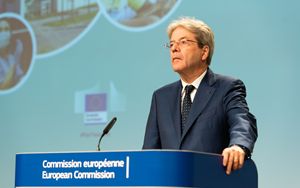(Finance) – The European Commissioner for Economy, Paul Gentlemenconfirmed his optimistic position regarding the prospects of there being an agreement between the Twenty-Seven on reform of the Stability Pact regarding national budget policies. Gentiloni, after having noted that there is no formal link between the new Stability pact and the ratification of the reform of Mes (the “State Rescue Fund”) by Italy, noted that the conclusion of the ratification process “is in the interest of all” member states.
“I have full respect for the positions of all the political forces of the various European countries” in the ongoing discussion on the new Stability Pact, said the commissioner speaking to Italian journalists at the end of the press conference on “semester European“, today in Strasbourg. “I see that the discussion is generating contacts continue and very intense between the different governments, and not only between France And Germany; the Italian government is also very involved in these discussions. Therefore – added Gentiloni – I remain optimistic about the possibility of reaching an agreement. We are not there yet but I think we can get there, and there is everyone’s commitment and in particular the Spanish presidency of the EU Council “to get there”.
The Finance Minister of Germany, Christian Lindnerinsisted on the need to ensure rehabilitation And sustainability of accounts with the reform. Franco-German cooperation, he said, “is making progress, but things have changed with higher rates.” Compared to a year ago, in which “we were only discussing increasing investments, today we talk much more about debt sustainability”, you explained during a conference on inflation and democracy. While saying he is in favor of transition energyLindner pointed out that some investments green are not conducive to economic growth but he did not specify which ones. “We need the money to ensure debt service. It is not easy to find funds to finance new investments – he warned –. The issue here is to maintain financial stability and in Europe many member states have to pay high interest rate differentials (spreads). I think they need to return to sound fiscal policies and lower deficits in order to reduce the debt-to-GDP ratio.”
